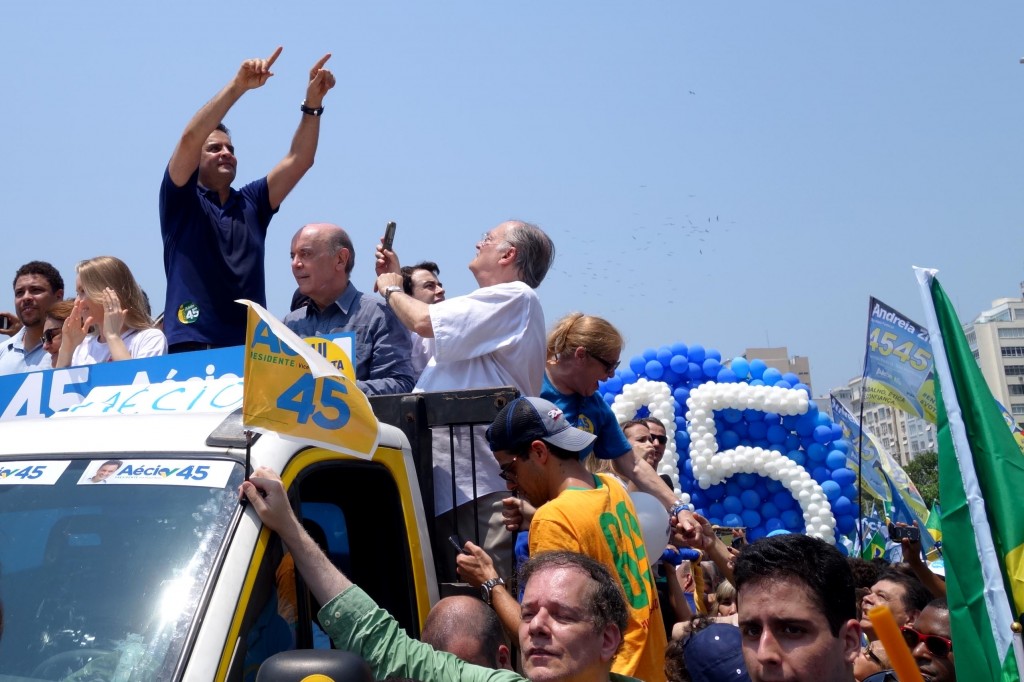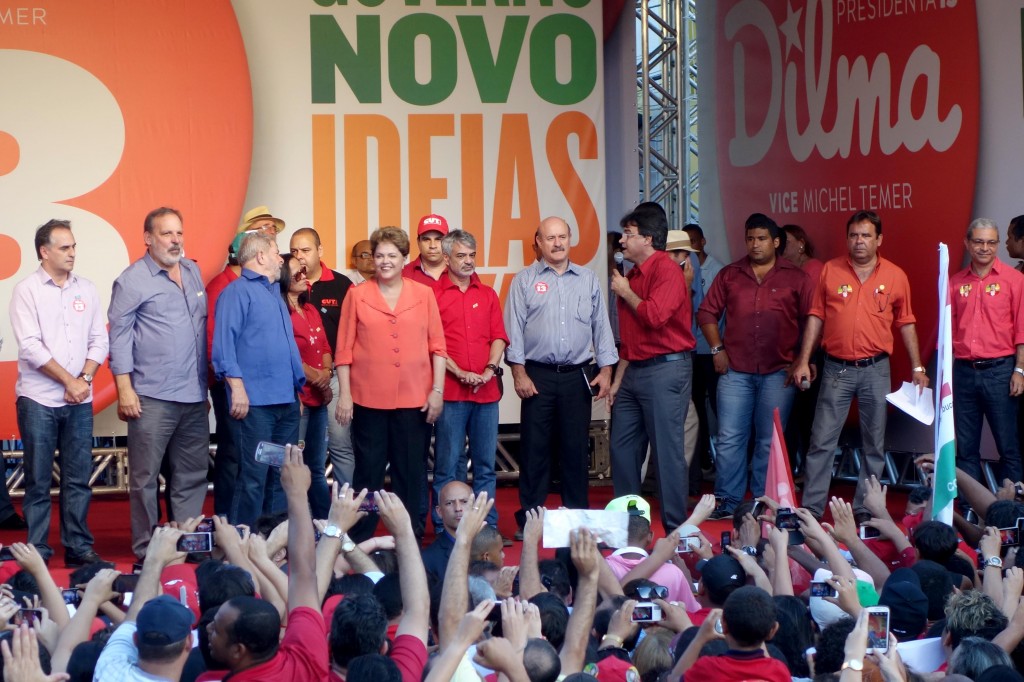Brazil’s hugely expensive election campaigns have focused on corruption, as they always do. But the same companies implicated in the Petrobras scandal are paying for the whole thing – as they always do – and the skyrocketing election costs are what put pressure on politicians to practice corruption in the first place.
Some 95% of Brazil’s campaign financing comes directly from corporations – primarily meat producers, construction companies, and banks – and while some politicians and legal bodies are pushing back against a system that badly distorts the world’s fourth-largest democracy, they will likely fail without political pressure.
Over the past few weeks, Brazilians have been subjected to a constant onslaught of campaign materials – slick TV ads, never-ending social media updates, unwelcome music blasts into their homes, quick presidential visits, and candidate flyers covering the streets. For some, it’s terrible. For others, it’s a carnival of democracy.
But for the country, it’s very, very expensive. And the huge companies who pay for it are not giving the money away for fun.
As we noted in today’s Los Angeles Times article on the subject, the amount of private spending on Brazil’s campaigns has exploded since Lula won in 2002. Then the total cost was around 800 million reais. This year, it’s expected to surpass 7 billion reais. The United States puts on the most expensive elections in the world (6.3bn dollars for the Presidential and Congressional races in 2012), but smaller Brazil is now spending a much larger proportion of its economy than even the US.
Analysts and insiders agree that this unregulated system distorts policy-making in favor of certain corporations and leads to corruption as politicos struggle to raise cash. It’s not news that around the world, big money influences politics in capitalist representative democracies. But here, the scale is just boggling. As Eurasia’s João Augusto de Castro Neves told us at the LA Times:
Brazil didn’t re-invent the wheel in terms of the way campaign finance affects politics. But compared to the US, campaigns are extremely expensive, due to the size of the country and the format of elections, and that increases the incentive for corruption…Most major corruption scandals in Brazil are directly or indirectly related to campaign finance.
When most Brazilians or foreign observers hear “corruption,” they usually think of some politician, usually an overweight middle-aged man, grabbing public money, stuffing it into a big sack, and running off to spend it in Miami or some tacky São Paulo nightclub. That’s not how it works at all. It usually involves some corporation finding a way to pay extra in return for a regulatory or contractual favor. That bribe then goes to the party funds to be used in an election campaign.

The entire spectacle appears farcical. They parade around, denouncing the very practices that got them the money to campaign in the first place. Arguably, meaningful campaign finance reform would reduce the incentive for corruption and level the playing field, taking influence away from Brazil’s biggest companies and reducing the big advantage that incumbent parties – currently the PT – have in elections.
There is basically no one that thinks the current system is good for Brazil’s democracy. But that doesn’t mean it will be changed. Those who know Brazil realize that a serious attempt to reform it is the political equivalent of asking turkeys to vote for Christmas.
Congressman Henrique Fontana put forward a PT political reform proposal that includes public election financing and a cap on spending. Unsurprisingly, it hasn’t gotten far in PMDB-dominated Congress. Meanwhile, the OAB, Brazil’s lawyer association, is trying to get the Supreme Court to declare the current system unconstitutional. The OAB president told us at the LA Times:
“The actual system is, in reality, a business investment strategy, in which large economic groups establish an extremely unhealthy relationship with democracy,” said President Marcus Vinicius Furtado Coelho, “The vote of the owner of a construction company should not be worth any more than his worker.”
But it is. Let’s take a look at who has funded this election, up until the last federally required filing date on September 9th.
This was nearly a month before Neves made it into the second round, and the largest donor to Rousseff’s campaign and her party was construction company OAS, who gave 58 million, but also gave 11 to Neves. Meat producer JBS donated 48 million to Rousseff, in addition to 13 for Neves, while Andrade Gutierrez, a multinational construction conglomerate, gave Rousseff 27 and Neves 20. Construction company Odebrecht gave 18 million to Rousseff and 8 to Neves, whose campaign confirmed its funding has ramped up since then, as he took the lead into the second round. For a more complete look, click above.
OAS, Odebrecht and Andrade Gutierrez are among those that have been named in the media among the companies that may have paid bribes to win contracts from Petrobras. The scandal initially revolved around alleged kickbacks passed on to the ruling Worker’s Party and allies, but it has since come out that the president of Neves’ PSDB also may have received a bribe.
The Petrobras scandal is huge, and involves the major parties, so is a big story. But around Brazil, accusations of campaign finance malfeasance are so common they barely make a splash.
Earlier this year, the government of the state of Amazonas made a new deal to pay back hundreds of millions of dollars to Andrade Gutierrez.
An opposition state assemblyman questioned why the poor Amazon government would voluntarily move payments forward to 2014, an election year, and pay $85 million more than was actually owed, to one of the country’s biggest campaign donors.
“That’s money that can be used on desperately needed schools and hospitals,” said Assemblyman Chico Preto. “I have no doubt that money was intended to be used to benefit the campaigns of Senate candidate Omar Aziz and Governor José Melo.”
Andrade Gutierrez has done lots of other big business with the state government. Most famously, they built its controversial and expensive World Cup stadium in Manaus, the brilliantly colorful Amazon Arena, by far the most advanced and impressive structure in the sweltering jungle town, which has struggled to attract crowds since the soccer tournament ended.
The Public Ministry in Amazonas put forward arguments against the payment scheme, and it was frozen by courts there. But despite Preto’s open accusations against the ruling politicians, the story was barely covered.
In São Paulo, after protests over transportation quality led over a million to take the streets around the country last year, a scandal involving the metro here emerged. During the re-election campaign of governor Geraldo Alckmin, who oversees the metro, Folha reported that 56% of his campaign was paid for by companies implicated in the scandal, including OAS.
As in most countries with influential private campaign finance, it’s difficult to point to specific ways which companies benefit. But it’s easy to guess. Personally, when I think “meat companies,” I think of the effect on the Amazon and the environment. When I think construction, I think of the rampant development in places like São Paulo to the detriment of public space and urban life. And with banks, you don’t even have to think.
For the article, Andrade Gutierrez declined to comment about the Amazonas payment deal, but said that “all donations made by the company are carried out in accordance with Brazilian law,” speaking through a spokesperson. The Amazonas governor’s office did not respond to questions despite repeated promises to do so.
OAS said that all its electoral donations are legal. Odebrecht says that its donations are meant to “contribute to Brazil’s economic and social development,” while JBS said that all its donations are legal and that the company “is present in practically all of Brazil’s states,” the spokesperson added. “Donations have the objective of promoting electoral debate and strengthening democracy.”
None of the three companies admit wrongdoing in the Petrobras scandal. OAS says it performs all its activities in line with legal and ethical standards, while Andrade Gutierrez argues the leaks don’t link the company to any activity, and Odebrecht “vehemently” objects to a situation where parts of an investigation are leaked to media, without the company’s right to know what is being accused or defend itself, calling it “undemocratic.”
In the past, JBS and Brazil’s meat industry – often considered the main cause of deforestation in the Amazon – have been accused by Greenpeace of failing to meet commitments to avoid deforested land. But JBS, which receives billions from the BNDES state development bank, says it is completely committed to sustainably sourcing its materials, saying it does not “acquire land from suppliers involved with deforestation, invasions of indigenous or conserved land, violence, agrarian conflict or slave labor.”
OK well that’s good then.
Photos above are of Dilma’s campaign event in Goiana, Pernambuco, with Lula, and of Aécio Neves’ march in Rio, with Ronaldo. Both taken by Vincent Bevins. Most of the information in this article was gathered reporting for today’s LA Times article on campaign finance and the Petrobras scandal, which can be found here.



